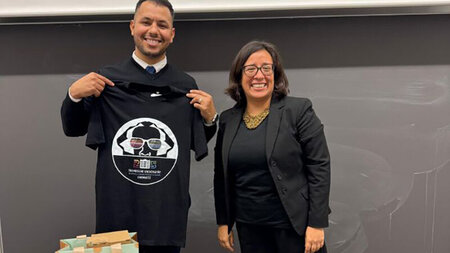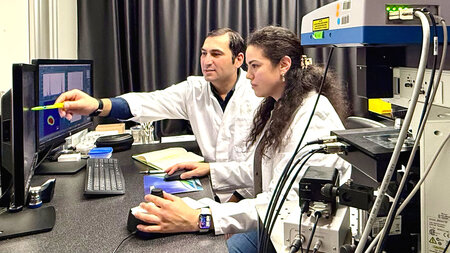Doing a doctorate with a cotutelle procedure
A cotutelle procedure is a binational, integrated doctoral procedure that is carried out at TU Chemnitz and a foreign partner university. The doctoral candidate is supervised by professors of both universities during the doctoral process. While working on the dissertation, the doctoral candidate spends time at both universities. After completion of the cotutelle procedure, the doctoral candidate receives either a jointly awarded doctoral certificate from both universities or a national doctoral certificate from each of the participating universities, which refers to the jointly supervised procedure.
The first step should always be to coordinate with your potential supervisors whether and how a binational doctorate can be conducted.
In order to carry out a cotutelle doctorate, an individual agreement is made for each doctoral candidate at the beginning of the cotutelle procedure.
The preparation and conclusion of your individual cotutelle agreement is coordinated centrally by the Internationa Office (IUZ). Please do not hesitate to contact the International Office if you have any questions, we are happy to assist you!
You should consider a cotutelle procedure if
- your research focus is strongly oriented towards both participating countries,
- your topic is in the research interest of two supervisors in different countries,
- the close involvement of a partner university abroad means thematic added value,
- you are aiming for a career in the partner country or with an overall strong international focus.
With a cotutelle procedure you
- improve your linguistic and intercultural skills,
- gain intensive knowledge of another university and scientific system,
- immerse yourself in another scientific system.
A cotutelle procedure involves considerable bureaucratic effort. You should refrain from a cotutelle procedure if
- a total stay of at least 12 months abroad is not feasible for you,
- it is not ensured that the supervisors in both countries coordinate closely and in a spirit of trust,
- the period within which you wish to complete your doctorate is of primary importance to you,
- ou cannot finance the additional costs for the stay(s) abroad.
You should also keep in mind that in most cases at least a summary of the dissertation must be written in the national language of the partner university as well. The decision for or against a cotutellelle procedure should thus take into account your level of proficiency in this foreign language.
In order to carry out a cotutelle procedure, the legal bases applicable to doctoral degrees at the foreign partner university must not prevent the implementation of binational doctoral procedures. Furthermore, the legal provisions applicable to doctoral studies (e.g. University Act, doctoral regulations, ministerial decrees and ordinances) at TU Chemnitz and at the foreign partner university must be essentially the same or sufficiently compatible with regard to the requirements for admission to doctoral studies, the examination work to be completed for the doctorate, and the individual steps in the doctoral process and the committees responsible for this, in order to enable the joint execution of a binational doctoral process. Ideally, the doctoral regulations of the two participating faculties should contain special regulations for binational doctorates. Therefore you should first check whether a cotutelle procedure is possible at your faculty at TU Chemnitz and the partner university.
Then please check whether you meet the admission requirements for a doctorate at both universities! This may require the involvement of the faculty council. The requirements to be admitted to doctoral studies can be found in the doctoral regulations of the participating faculties.
It is of pivotal importance for your project that you find a professor at each of the two universities who will supervise your doctorate. The two supervisors should also be available to the administrative offices of both universities for formal questions regarding your cotutelle procedure.
Together with your supervisors at both universities, you will agree on all organizational and formal requirements that are relevant for the implementation of the cotutelle procedure. For this purpose, TU Chemnitz has developed a catalog of questions and compiled notes that serve the supervisors to prepare the cotutelle agreement. Access to this questionnaire is restricted to employees of TU Chemnitz.
After you have collected all information for the questionnaire, your supervisor at TU Chemnitz will obtain the confirmation of the doctoral committee and the dean so that the individual agreement for your binational doctorate can be prepared.
Based on the information you provide, the International Office will prepare a draft agreement, which will be legally reviewed by the Department of Academic and Student Affairs. The draft agreement must also be legally reviewed and confirmed by the partner university. Once this confirmation has been received, the agreement can be concluded.
In principle, the cotutelle procedure at TU Chemnitz is very similar to the purely national doctoral process. Deviations can occur due to the requirements for a doctorate at the foreign partner university. In some countries, for example, it is necessary to attend certain courses during the doctoral phase. In some cases, there are also strict time restrictions, so that the doctorate must be completed within a certain period of time. Before deciding on a binational doctorate, you should clarify with your supervisors exactly how the cotutellelle doctorate is structured.
Compared to a purely national doctorate, there are the following differences:
In the run-up to the cotutelle procedure, you will need to make extensive arrangements with your supervisors. This preparatory work is important to ensure that the procedure runs smoothly and that there are no unnecessary challenges in the end. In order to go through a cotutelle procedure, it is imperative that an agreement is concluded for it. This agreement provides you, your supervisors and the participating universities with certainty about the procedure.
Since in the case of a binational doctorate, in addition to the doctoral regulations of TU Chemnitz, the requirements of the doctoral regulations of the partner university must also be observed, differing regulations may apply regarding:
- number of supervisors,
- composition of the doctoral/examination committee,
- types of examinations,
- number of required copies,
- Grading scheme "passed/failed" at the partner university.
A very important difference concerns the language: The language in which you write the dissertation, the public defense and, if necessary, oral examinations can or must be taken is regulated in the doctoral regulations. As a rule, you must also provide a summary of the dissertation in the other language. If you write the dissertation in English, summaries are usually required in German and in the national language of the partner university.
Cotutelle procedures are a good opportunity to maintain and expand existing international partnerships. A binational doctorate increases the visibility of your doctoral students and your professorship. Close cooperation with an international partner enables you to regularly produce international publications. In general, a cotutelle procedure is particularly suitable if the designated supervisors already collaborated or have cooperated academically and thus already have a common basis of trust.
Nevertheless, a cotutelle procedure also means a considerable additional organizational effort compared to a purely national doctorate. In particular, you should not underestimate the need for coordination in the preparation of the cotutelle agreement for the doctoral candidate, neither in terms of organization nor in terms of time.
In order to support you in coordinating this process, the International Office has compiled further information for supervisors and formulated a list of questions. These can be accessed in a password-protected manner. The catalog of questions serves to make the requirements of both universities regarding the doctoral procedure transparent for all those involved from the very beginning of the cotutelle procedure.
There are two options for the doctoral certificate according to a cotutelle procedure:
- award of a joint certificate by the participating universities,
- award of national doctoral certificates of the participating universities, which must contain a reference to the joint supervision of the doctorate.
Please note that the award of two national doctoral certificates does not entitle the holder to hold a double doctoral degree! Instead, you must decide which of the two titles you wish to hold. You can change this decision at any time.
The German Academic Exchange Service (DAAD) offers a funding program especially for cotutelle doctorates. For binational doctorates with French partner universities, the German-French University also offers a support program (available in German only).
In order to integrate an international component into your doctoral process, it is also possible to
- do a shorter stay abroad,
- secure a second supervision through a professor at a foreign university.





